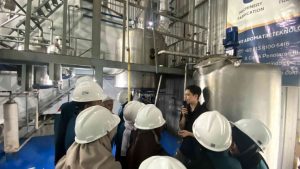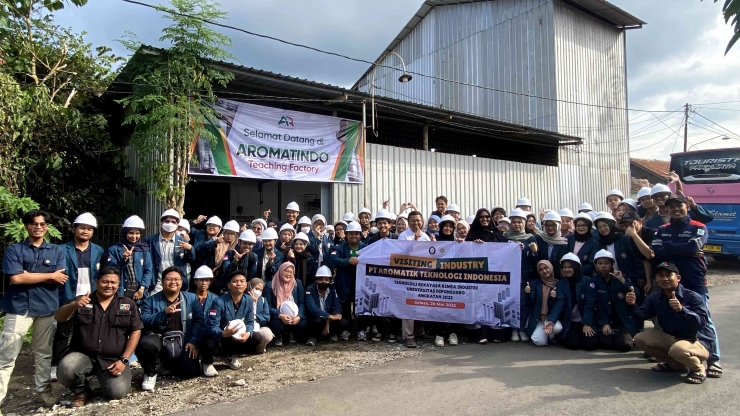Semarang, May 20, 2025 — A total of 66 students from the Industrial Chemical Engineering Technology (TRKI) Study Program at the Vocational School of Diponegoro University conducted an industrial visit to PT Aromatik Teknologi Indonesia (Aromatindo) on Tuesday, May 20, 2025. This activity is part of the experiential learning implementation for the Technology-Based Enterprises course, aimed at introducing students to the real-world application of chemical technology in industries that utilize local natural resources.
The students were accompanied by two supervising lecturers: Abdullah Malik Islam Fillardli, S.T., M.T., who teaches the course, and Dr. Eng. Vita Paramita, S.T., M.M., M.Eng., the academic advisor for the class of 2022. The visit was warmly welcomed by Dona Sulistia Kusuma, M.Si., founder and owner of PT Aromatindo. In his remarks, Abdullah Malik Islam Fillardli emphasized that the visit is a crucial part of the learning process, bridging classroom theory with the dynamic and evolving practices of industry. “Students need to understand how innovation happens directly in the field. This will foster technology-based entrepreneurial insight and prepare them for the workforce,” he said.

Dr. Eng. Vita Paramita also highlighted the importance of industrial visits as a strategic form of collaboration between vocational education and industry players. According to her, field experience like this equips students not only with technical knowledge but also with an understanding of professionalism and innovation values. During the visit, participants were welcomed by Dona Sulistia Kusuma, M.Si., who presented the company’s founding history, its main product lines such as essential oils from citronella, patchouli, and sandalwood, and the extraction and processing technologies employed.
Additionally, students were given a tour of PT Aromatindo’s production facilities. They observed firsthand the extraction process of aromatic materials, the distillation of essential oils, and the quality control stages that ensure product quality before it reaches the market. The visit also included an interactive discussion session covering various topics, including business opportunities for essential oils in export markets, the development of appropriate technologies, and sustainable strategies for resource-based industries. Through this activity, students gained in-depth insight into the aromatic industry’s production chain—from raw material selection and extraction technology application to energy efficiency, waste management, and global marketing of aromatic products. They also learned about the critical role of research and innovation in creating competitive advantages for local industries.
The visit concluded with a souvenir presentation and group photo session. This industrial visit is part of TRKI UNDIP’s learning strategy to produce vocational graduates who are competent, adaptable, and capable of competing and contributing to the development of a national industry rooted in local potential and technology.


Recent Comments